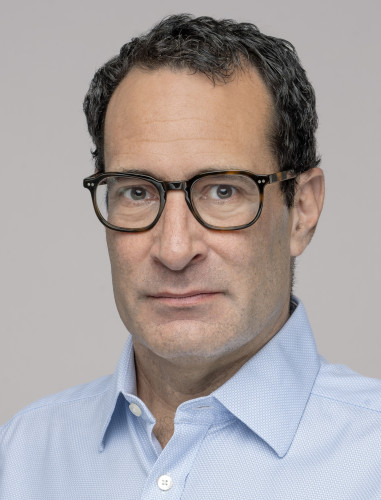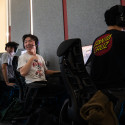UW–Madison unveils strategic vision to boost entrepreneurship

The working group’s recommendations call for establishing a signature on-campus entrepreneurship unit to coordinate efforts and foster collaboration among partners, industry, students, alumni and faculty. Photo: Bryce Richter
The University of Wisconsin–Madison is positioning itself to strengthen entrepreneurial pathways, experiences and outcomes, drawing on the findings and recommendations of a study commissioned by Chancellor Jennifer Mnookin.
The comprehensive plan outlined in the study aims to create a thriving entrepreneurial environment, leveraging the university’s existing strengths and capabilities along with its ongoing commitment to fostering entrepreneurship across campus.
Mnookin has made entrepreneurship a key priority for the university. In 2023, she charged the working group, comprised of entrepreneurial and innovation leaders from campus and industry, with reviewing current practices and making recommendations.
“UW already is a thriving hub of innovation and entrepreneurial excellence, and we have an opportunity to make it even stronger,” Mnookin says. “This report, and its recommendations, provide a roadmap not just to unify our existing programs, but to chart a new direction to further empower our entrepreneurial community to lead in ways that truly differentiate us on a national and global scale.”
Titled ‘Empowering the Wisconsin Idea: The Future of Entrepreneurship at the University of Wisconsin–Madison,’ the report delineates recommendations in four key areas:
- Commit to excellence in entrepreneurship.
- Establish campus leadership and structure to bolster entrepreneurship.
- Create a culture to promote and celebrate entrepreneurship.
- Expand access to capital.

Jon Eckhardt
The committee behind the report was co-chaired by Jon Eckhardt, Pyle Bascom Professor of Business Leadership – who also holds an appointment in the Wisconsin Institute for Discovery – and Chris Kozina, former assistant vice chancellor for industry engagement, now a consultant with the university. It featured members from industry, campus administration and UW–Madison’s faculty.
Members included Zach Ellis, founder and managing partner at South Loop Ventures; Stephanie Furlong, strategic initiatives manager within UW–Madison’s Office of Business Engagement; Valarie King-Bailey, founder and CEO of OnShore Technology Group, Inc.; Rock Mackie, co-founder and board chairman of Centaur Medical Holdings and emeritus faculty at UW–Madison School of Medicine & Public Health; Scott Resnick, co-founder and COO of Hardin Design & Development; and Anne Smith, emeritus faculty at UW–Madison Law School.
Chancellor Mnookin recently appointed Eckhardt as special advisor for the entrepreneurial initiative, underscoring her commitment to moving the effort forward.
“The appointment of Jon Eckhardt as special advisor marks a crucial first step in our journey to elevate entrepreneurship at UW–Madison,” Mnookin said. “Entrepreneurship is an area where we have opportunities to do even more to spur life-changing innovations and further magnify our economic impact across the state and beyond. I’m confident Jon’s leadership, building on the excellent work of the committee, will launch this initiative forward with the energy and focus it needs.”
Eckhardt highlighted the potential impact of the new approach to entrepreneurship on campus.
“By adopting a founder-first approach, we can put our faculty, students, staff, and alumni at the center of entrepreneurship,” he says. “This aligns perfectly with our core activities of teaching, research, and service, while advancing the Wisconsin Idea in new and exciting ways. An intended impact of the founder-first strategy is to spur the formation of more companies across the region and state, extending our impact beyond Madison.”
The recommendations call for establishing a signature on-campus entrepreneurship unit to coordinate efforts and foster collaboration among partners, industry, students, alumni, and faculty.
It also calls for streamlining policies to reduce barriers for entrepreneurs, as well as exploring investments in new physical spaces to foster entrepreneurship and engagement with outside expertise.
“Our work identified so many opportunities for UW–Madison to build on its strengths and take its support for entrepreneurs to the next level,” says Mackie, a member of the committee. “The potential here is enormous, and it’s exciting to see how these changes could spark even more innovation and growth, both on campus and in increasing the university’s engagement across the state and region.”
Looking ahead, the university has outlined a series of next steps to implement report recommendations. Eckhardt, in his new role as a special advisor to the chancellor, will lead efforts to align key stakeholders and explore structures to support the design of a formal campus entrepreneurship platform.
“Over the coming year, we’ll be focusing on three key areas,” Eckhardt explains. “We’ll be working on the structure and tactics needed to support entrepreneurship, recruiting top talent to lead our efforts, and gathering data to refine our approach and demonstrate the immense potential of this initiative.”
The university will collaborate with key partners such as the Wisconsin Alumni Research Foundation, the Wisconsin Foundation and Alumni Association, University Research Park and others in considering and implementing the report’s findings and recommendations.
UW–Madison has a long history of entrepreneurial excellence and support to build on. In addition to more than 60 programs and courses focused on entrepreneurship education, the university provides a range of services designed to assist campus entrepreneurs, including the Innovate Network, Discovery 2 Product (D2P), the Technology Entrepreneurship Office and more.
View the executive summary.
View the entire report.
If you encounter any accessibility barriers while accessing the content in the report PDFs, please email sfurlong@wisc.edu for assistance.



